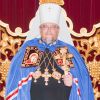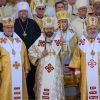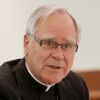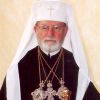Orthodox leader: North's America's churches can be example for Ukraine
PORTAGE LA PRAIRIE, Manitoba - Catholic and Orthodox churches in Canada and the United States can be an example for their counterparts in Ukraine, Canada's top Ukrainian Orthodox leader told the Ukrainian Catholic Synod of Bishops.
Ukrainian Orthodox Metropolitan Yurij of Winnipeg, addressing the worldwide synod Sept. 10, told the bishops it was "evident that our God is blessing us and helping us develop this better relationship."
"We also pray that in Ukraine this same attitude will develop as well," he said at the first meeting of the synod. The synod is private, but part of its initial session was open to media.
Metropolitan Yurij told several dozen Ukrainian Catholic bishops that the North American Catholic and Orthodox bishops have worked through the "animosity" that once marked relations between their Churches, and they now collaborate.
"In Ukraine, they have to go through the same kind of process," he said, and the bishops outside Ukraine must be patient with their brothers.
While the majority of Ukrainians are Orthodox, they are divided into three Churches: one in communion with the Russian Orthodox Church, one with a patriarch in Kiev and the third known as the Autocephalous Ukrainian Orthodox Church.
The forced unification of the Ukrainian Orthodox Church with the Moscow Patriarchate of the Russian Orthodox Church in the 1940s "is one of the principal problems," the metropolitan said.
The 2010 election of Ukrainian President Viktor Yanukovych, a member of the Orthodox Church in communion with the Moscow Patriarchate, appears to have fueled long-standing tensions between Orthodox loyal to Moscow and those who support an independent Orthodox Church in Ukraine. Yanukovych has worked to strengthen ties with Russia.
Metropolitan Yurij did not mention politicians. However, he did note that the Russian-affiliated Ukrainian Orthodox Church is the only one canonically recognized by the Ecumenical Patriarchate of Constantinople. So, for instance, when Patriarch Filaret of the Ukrainian Orthodox Church-Kiev Patriarchate visited Canada in April, Metropolitan Yurij did not meet with him.
"I have directors also," he said, referring to the ecumenical patriarch, considered first among equals of Orthodox leaders. "I am part of the community of the Orthodox, and he (Patriarch Filaret) is not recognized as a patriarch, so I could not meet him."
Archbishop Sviatoslav Shevchuk of Kiev-Halych, Ukraine, the elected head of the Ukrainian Catholic Church, told Metropolitan Yurij he often finds himself caught in the middle of the delicate situation in Ukraine.
Shevchuk deals with leaders of all three Ukrainian Orthodox churches. Yet every time he has contact with someone from one of the non-canonical Ukrainian Orthodox Churches, "right away a letter goes from Moscow to Rome" asking why the Ukrainian Catholic Church is collaborating with them.
"Directly or indirectly ... I end up being a kind of a go-between between the Orthodox Church and the Roman Catholic Church," he said.
Shevchuk said he, like his predecessor, Cardinal Lubomyr Husar, believes that "we can and we must be ambassadors of the whole Kievan Church," a term used to refer to all Eastern churches based in Ukraine.
Metropolitan Yurij and Winnipeg Archbishop James Weisgerber thanked the synod members for inviting them to the opening session and to the previous day's Divine Liturgy.
Weisgerber, former president of the Canadian Conference of Catholic Bishops, told them, "Sometimes we get the impression that — because the Roman Catholic Church is so large — that it has nothing to learn from anyone else.
"This is a great, great mistake. Often the smallest have the most important things to say," the archbishop said.
The synod was scheduled to meet behind closed doors in Portage la Prairie until Sept. 15 before a public closing celebration in Winnipeg Sept. 16.
Ukrainian Catholic bishops in Winnipeg to discuss next steps in vibrant-parish plan
WINNIPEG - Ukrainian Catholic bishops from around the world gathered in Winnipeg to discuss how to make their parishes more vibrant — especially through the involvement of laypeople.How they do that requires solutions as varied as the parishes that represent more than four million Ukrainian Catholics on four continents.
"We have parishes that are growing" and need pastoral, financial and structural support, said Bishop Ken Nowakowski of New Westminster, B.C., who heads the Ukrainian Catholic Church's implementation team for its strategic plan, "Vision 2020."
Some urban parishes have an aging population and declining numbers, and synod members must decide how to support the parish priest who spends so much time visiting the sick and officiating at funerals, said Nowakowski. At the other end of the spectrum, the bishops must consider how to help keep priests in busy, large parishes from burning out.
The vibrant parish initiative was approved by the synod in 2011 when the bishops met in Brazil. Their first steps have included making sure that clergy understand the plan and representatives of each of the Ukrainian Catholic eparchies, or dioceses, designated a priest-representative to help introduce the plan within the diocese.
Nowakowski said that about 70 per cent of the world's 4,500 Ukrainian Catholic priests have given feedback and are involved with the plan. This year Church leaders hope to involve religious communities and monastics, he said. He told Catholic News Service he would present synod members with a report on what has been accomplished and would include feedback. Synod members will either ask the committee to continue with its current plan or make changes, he added.
The Synod of Bishops, the Ukrainian Catholic Church's governing body, normally meets in Ukraine, but it is meeting in Canada Sept. 9-16 in honour of the centenary of the arrival of Canada's first Ukrainian Catholic bishop, Blessed Nykyta Budka.
Winnipeg's Ukrainian Archbishop Lawrence Huculak said as bishops from other countries arrived for the synod, they were impressed with the involvement of Canada's laity. Even the synod's organizational committee has laypeople on it, he said.
"It's not just the bishops ... the people are taking part and helping to organize it," he said.
Ukrainian Catholics in Canada have women's, men's and youth groups. Lay groups have national conventions, elect leaders and participate in the life of the Church.
"Although we (Canadians) may take it for granted, our laity have not been able to organize themselves in the same way" in some other countries, he said.
Last December, the head of the Ukrainian Catholic Church, Archbishop Sviatoslav Shevchuk of Kiev-Halych, Ukraine, outlined his vision in a pastoral letter to Ukrainian Catholics worldwide. In the letter, "The Vibrant Parish — A Place to Encounter the Living Christ," he spoke of the elements needed to "grow in holiness and unity in Christ Jesus."
Shevchuk said people of all ages must continue to learn about the faith — not only from the Bible, but also from the Catechism of the Catholic Church. Priests must teach and laity have a responsibility to learn because "permanent and continuous formation for various age groups ... is an essential component of the vibrant parish."
Parishioners must participate regularly in the sacraments, and families must once again become "a school of prayer," he said.
"Our parishes can become places where care is given to the orphan, protection for the widow, help for the poor, and where the suffering of the sick is shared," he said.
Parishes must have active pastoral and parish councils as well as "well-formed and mature co-workers who assist the priest in leading catechetical schools, church brotherhoods, charitable works, youth organizations and prayer groups," he said. "One of the most important responsibilities of leadership in the parish community is discerning God's will and searching for the best ways of implementing it in the life of the parish."
Everyone in the parish must have a missionary spirit, he said.
Christians aiding refugees is nothing new. Christians taking the Canadian government to court so refugees won’t be denied medication, artificial limbs or rehabilitative therapy is.
Hospitality House Refugee Ministry in Winnipeg has launched a lawsuit on behalf of the Anglican diocese of Rupert’s Land claiming breach of contract against Citizenship and Immigration Canada. Hospitality House is trying to block government plans to strip down its health insurance plan for refugees.
Cuts to the Interim Federal Healthcare Program for refugees take effect June 30.
Anishinaabe elders adopt Archbishop Weisgerber
WINNIPEG - Anishinaabe elders and community leaders adopted Archbishop James Weisgerber of Winnipeg as their brother April 14 in a traditional ceremony at Thunderbird House in Winnipeg, the first event of its kind in the reconciliation between Indian residential school survivors and missionary churches.
"This is part of a long journey for me," Weisgerber said.
As a priest in Saskatchewan, he had been a pastoral minister at four of what were then called Indian reserves, "but nobody ever talked about the residential schools," he said. In 1990, Phil Fontaine, former National Chief of the Assembly of First Nations, "made a public declaration and released a huge barrage, and more people began speaking and I began to understand," Weisgerber said.
WINNIPEG, Manitoba - Archbishop Michael Bzdel, who served as metropolitan for Ukrainian Catholics in Canada for nearly 13 years, died April 3 at his home in Winnipeg. He was 81.
He became metropolitan after his ordination as archbishop March 9, 1993. He served in the position until his retirement in January 2006.
Born to Ukrainian immigrants in Wishart, Saskatchewan, July 21, 1930, Archbishop Bzdel was the 11 of 14 children in his family.





